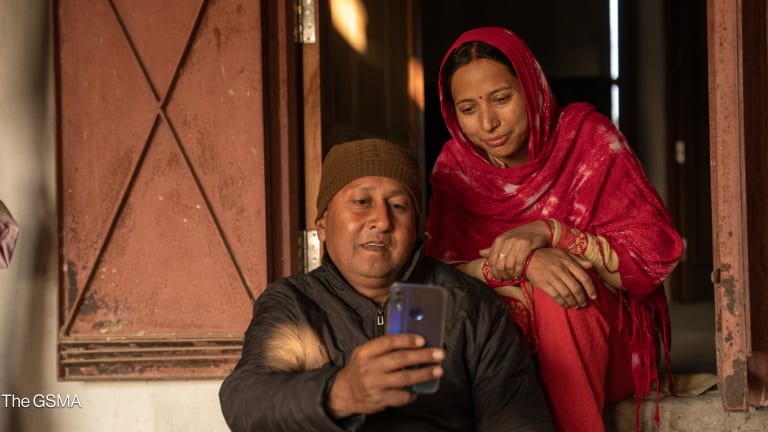Will Ethiopia’s telecom liberalization improve financial inclusion?
Development groups are looking for ways to leverage the ripple effects of liberalization — which include better connectivity, cheaper services, and a more competitive market — to improve financial inclusion.
Last October, Ethiopia, Africa’s second-most populous country, ended its longstanding state monopoly on telecommunication when the Global Partnership for Ethiopia — led by Safaricom — launched its services in the country of 120 million people. State-owned Ethio Telecom is now facing competition from the international consortium, which also includes Vodafone, Vodacom, Sumitomo Corporation, and British International Investment. The group paid a hefty licensing fee of $850 million to enter the large market. “For us, Ethiopia is what we call a powerhouse country. It's a big important country in Africa and we think it needs to meet its potential,” said Abhinav Sinha, managing director and head of technology and telecoms at British International Investment. He added that Safaricom has managed to gather 5.5 million customers across 25 cities. Liberalization has already driven down prices on services such as airtime and data, and the incumbent Ethio Telecom has had to improve its services to prepare for competition. The government also plans to privatize 45% of Ethio Telecom and a tender for a third mobile operator was just issued at the end of June. Development stakeholders are now looking for ways to leverage the ripple effects of liberalization — which include better connectivity, cheaper services, and a more competitive market — to improve financial inclusion. A push for financial inclusion Only 46% of adults in Ethiopia have an account at a financial institution. In comparison, 79% of adults in Kenya and 77% in Rwanda have a bank account. The government’s revised National Financial Inclusion Strategy aims to increase financial inclusion to 70% by 2025 — mainly by scaling digital payments through mobile money services. Ethio Telecom’s mobile money service Telebirr was launched in 2021 and has gained over 32 million subscribers. But it will soon face competition from Safaricom, which was granted a mobile money license in May and is now only “weeks away” from launching its flagship product M-Pesa, according to Sinha. In Kenya, research has found that mobile money lifted 2% of households out of poverty and that long-term consumption grew by 8.5% among those living in areas with many mobile money agents. Development groups are hoping to leverage similar opportunities in Ethiopia. "M-pesa entry into Ethiopia is likely to have a significant impact on the financial landscape with increased competition that will contribute towards financial inclusion. It is also expected to bring more investment into the sector with the expansion of the agent network," fintech consultant Tewodros Tassew said. In June, the World Bank Group announced a significant investment into the Global Partnership for Ethiopia, with the International Finance Corporation, its private investment arm, providing a $157.4 million equity investment and a $100 million loan to Safaricom Ethiopia. The Multilateral Investment Guarantee Agency will also provide 10-year insurance guarantees of $1 billion to cover the equity investments of Safaricom Ethiopia’s shareholders. “The reason why we supported this transaction is because of the huge development and transformative impact it can have on Ethiopia. Financial inclusion is one of the key areas, as well as just provision of basic 4G and 5G and other services throughout the country,” Sarvesh Suri, IFC’s regional director for infrastructure and natural resources in Africa, told Devex. In addition to boosting the overall economy, IFC estimates that the investment and the work of the Global Partnership for Ethiopia could create up to 1.5 million direct and indirect jobs, explained Suri. The potential of mobile money Mobile money has the potential to add $5.3 billion to the country’s GDP and lift 700,000 people out of extreme poverty if 60% of adults start using mobile money by 2030, according to a new research by GSMA. The move to a more digital economy would help the government increase its tax base and provide a well-needed boost to the economy, which has taken a hit following the war in the northern Tigray region which fueled the highest inflation in a decade, foreign exchange restrictions, and mounting debt amid reports of massive war spending by the government. But in order to achieve the ambitious goals, the GSMA report calls for more “[e]nabling policy and regulations, better payments interoperability, sufficient and widespread access points and high-quality agent networks.” While liberalization is key in bringing down prices and improving services, the work of development partners in helping the government set the right regulatory framework is also “extremely important,” Suri said. “There is a trifecta that often leads to massive financial inclusion, which is cheap bandwidth, cheap handsets, and secure and cheap payment mechanisms … and whenever you see this coming together you will see massive increases at least in financial inclusion digitally,” said BII’s Sinha. China walked down this path in 2009-10, as did India in 2017-18, he explained. What’s needed for Ethiopia to follow suit is to improve access to cheap handsets, ideally smartphones. “If we can get something around the $40-50 mark, that’s the point where you start seeing this massive shift in people consuming apps and financial inclusion,” he said. But creating cheap handsets requires a systemic intervention and government support through the taxation of components. “You need to be able to export the handsets from Ethiopia to get forex to then afford the dollars for importing the components,” Sinha said. Bringing financial inclusion to rural areas Currently, nearly 50% of the country’s ATMs and 77% of point-of-sale machines are concentrated in the capital Addis Ababa and access to financial service locations is one of the biggest barriers for rural communities, Tassew said. “Financial institutions are often concentrated in urban areas, making it difficult for people in rural areas to access them. Financial service providers are using digital channels and predominantly mobile phone devices and agent networks to mitigate this challenge,” he told Devex in an email. According to GSMA’s report, there are currently insufficient mobile money access points for the population, and more agents are needed to cover underserved areas. A two-year project, launched by the United Nations Capital Development Fund and Bill & Melinda Gates Foundation, hopes to change this by building up the country’s agent networks and improving access to financial services by boosting the reach and quality of cash-in/cash-out networks. Investing in digital skills But investments in digital skills are often overlooked, despite being “a very important aspect of digitalization,” said Tsedeniya Namrud, the head of digital capacity building and public engagement unit of the Digital Transformation program at the Ethiopian Ministry of Innovation and Technology. Ethiopia’s general literacy is low at only 52%, and “if people don’t have the basic reading, writing, and numeracy capabilities, they don’t have the ability to use digital financial services,” said Namrud. While there are some capacity-building projects, it’s not enough, she explained, adding that you have to be very persuasive for institutions to invest in digital skills because it’s not something tangible. “It’s not a server, or you know, infrastructure, so people tend to overlook the digital skills aspect,” she said. Her unit is now working on a project with the UNCDF to conduct a nationwide digital financial skills survey to get baseline data that can help guide policies. “The major gap in the digital skills and digital financial area is that we don't have enough data to make decisions,” said Namrud. According to her, the project will also focus on providing digital financial literacy training to about 200,000 citizens, prioritizing women and smallholder farmers, through in-person training and the development of localized training content in local languages. While everyone from telecommunication to government to development partners are working to pull their weight to advance financial inclusion, Namrud believes more collaboration is needed. “Everybody does their work in silos, which is very unfortunate because there are lots of resources being brought here from development partners and other institutions. But the collaboration and coordination is very much lacking,” she said.
Last October, Ethiopia, Africa’s second-most populous country, ended its longstanding state monopoly on telecommunication when the Global Partnership for Ethiopia — led by Safaricom — launched its services in the country of 120 million people.
State-owned Ethio Telecom is now facing competition from the international consortium, which also includes Vodafone, Vodacom, Sumitomo Corporation, and British International Investment. The group paid a hefty licensing fee of $850 million to enter the large market.
“For us, Ethiopia is what we call a powerhouse country. It's a big important country in Africa and we think it needs to meet its potential,” said Abhinav Sinha, managing director and head of technology and telecoms at British International Investment. He added that Safaricom has managed to gather 5.5 million customers across 25 cities.
This article is free to read - just register or sign in
Access news, newsletters, events and more.
Join usSign inPrinting articles to share with others is a breach of our terms and conditions and copyright policy. Please use the sharing options on the left side of the article. Devex Pro members may share up to 10 articles per month using the Pro share tool ( ).
Natalie Donback is a freelance journalist and editor based in Barcelona, where she covers climate change, global health, and the impact of technology on communities. Previously, she was an editor and reporter at Devex, covering aid and the humanitarian sector. She holds a bachelor’s degree in development studies from Lund University and a master’s in journalism from the University of Barcelona and Columbia Journalism School.








